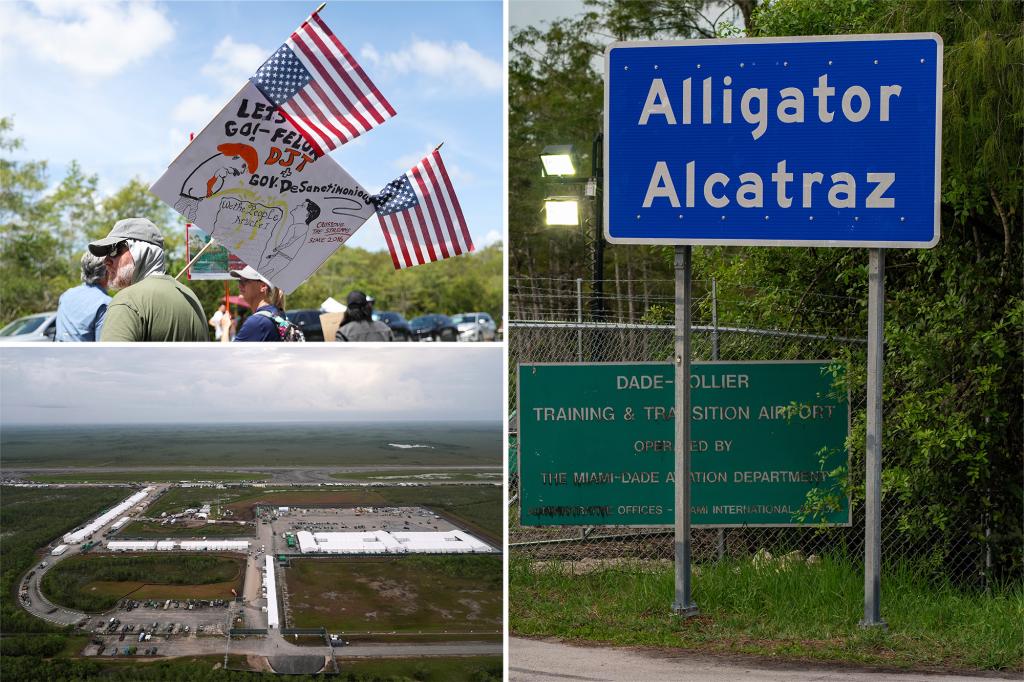Federal Judge Blocks Controversial Florida Detention Center Expansion
In a significant legal setback for the Trump administration, a South Florida federal judge has rejected the Department of Homeland Security’s request to pause dismantling the controversial detention facility nicknamed “Alligator Alcatraz.” US District Judge Kathleen Williams stood firmly by her previous ruling that bars the facility from accepting new detainees and requires partial dismantling within 60 days. This detention center, situated deep in the Everglades, has become a flashpoint in the ongoing national debate about immigration enforcement and environmental protection. Originally designed to hold up to 2,000 detainees, the facility was in the process of expanding to accommodate as many as 4,000 individuals before the court’s intervention. According to a DHS source, the current detainee population has already dwindled to approximately 100 people as the facility begins the court-ordered wind-down process.
The legal battle stems from several lawsuits brought by environmental organizations, civil rights groups, and the local Miccosukee Tribe, who collectively argued that federal officials failed to conduct mandatory environmental impact reviews. These plaintiffs expressed serious concerns about the detention center’s potential effects on surrounding wetlands, endangered species, and the tribe’s water and food resources. They further contended that continued operation of the facility could potentially undermine billions of dollars of environmental restoration work in the Everglades ecosystem. Judge Williams, an Obama appointee, found these arguments compelling, determining that the government had indeed violated the National Environmental Policy Act (NEPA) by bypassing required environmental reviews. Her comprehensive ruling not only halted the admission of new detainees but also ordered the removal of fencing, lighting, gas hookups, generators, and sewage systems within 60 days, effectively preventing the planned expansion.
In her Wednesday decision rejecting the stay request, Judge Williams reinforced her previous findings, noting that the federal government provided “no new evidence or argument about the particular dangerousness of the detainee population… or the need for a detention facility in this particular location.” She emphasized that “immigration enforcement goals will not be thwarted by a pause in operations,” directly countering the administration’s central argument that her ruling improperly interfered with federal immigration enforcement prerogatives. The judge also referenced “substantial evidence provided by Plaintiffs of several kinds of ongoing and likely future irreparable harm from the project,” highlighting the potential damage to wetlands, endangered species, and those who “live, recreate, research in, and work to preserve the area.” This reasoning reflects the court’s careful balancing of immigration enforcement objectives against environmental protection concerns.
The detention facility, built on an abandoned airport deep within Everglades National Park, has had a controversial history from its inception. Florida Governor Ron DeSantis, a Republican, used emergency powers to expedite its construction, which was completed in just eight days before opening on July 1. During the legal proceedings, a lawyer representing the DeSantis administration argued that “Alligator Alcatraz” should be considered a state project, thereby exempting it from federal environmental review requirements. Despite this contention, Judge Williams determined that federal laws still applied. At a press conference on Wednesday, Governor DeSantis acknowledged the ongoing litigation but reaffirmed his commitment to the project, stating: “We’re ready to help, we want to continue to help, we have to continue with this mission, it’s important and ultimately it’s gonna be good for the state of Florida.” His comments highlight the political dimensions of this case, which touches on both immigration policy and state-federal relations.
The Department of Homeland Security has responded to the court’s decision with obvious frustration but indicated compliance with the order. A DHS official confirmed Thursday that the agency is “complying” and relocating detainees to other facilities. However, the same official characterized Judge Williams as an “activist judge” and criticized her ruling as “yet another attempt to prevent the president from fulfilling the American people’s mandate to remove the worst of the worst — including gang members, murderers, pedophiles, terrorists, and rapists from our country.” This strongly-worded response reflects the administration’s position that the facility is essential to its immigration enforcement strategy and public safety objectives. The rhetoric also underscores the highly charged political context surrounding immigration detention policies.
This case illustrates the complex intersection of immigration enforcement, environmental protection, indigenous rights, and federal-state jurisdictional questions that increasingly characterize modern governance challenges in the United States. As the 60-day deadline approaches for dismantling portions of the facility, both sides are likely preparing for the next phase of legal battles. The administration has already indicated its intention to appeal Judge Williams’ original ruling, suggesting this controversy is far from resolved. Meanwhile, environmental advocates and the Miccosukee Tribe may view this as a significant victory in their efforts to protect the delicate Everglades ecosystem from what they perceive as hasty development without proper environmental safeguards. The outcome of this ongoing legal struggle will potentially set important precedents regarding the balance between immigration enforcement priorities and environmental protection requirements under federal law.


